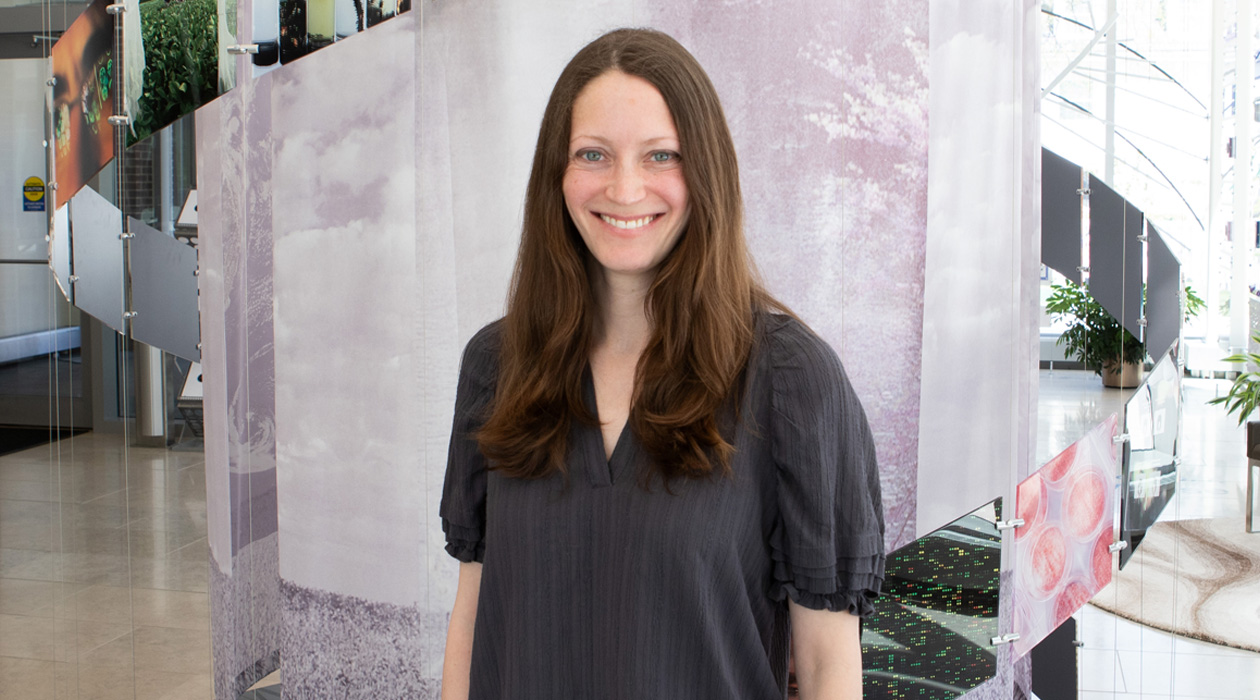Decoding decisions of parental stickleback fish
Growing up in upstate New York, Tina Barbasch spent countless hours catching salamanders and frogs in her backyard woods. Although her initial dream was to become a veterinarian, a suggestion from a friend’s mother, who was a biologist, steered her towards a career in research. Reflecting on her upbringing, she credits her father, a mathematics professor at Cornell, for showing her that "research was a real profession that people could have.”
Barbasch pursued her undergraduate studies at Cornell, majoring in Biology. It was there that her interest in behavioral studies blossomed, particularly through working on a project with local spotted salamanders. This passion led her to Boston University, where she earned a PhD in marine ecology and animal behavior under the guidance of Peter Buston. Her doctoral research delved into social behaviors and parental care in clownfish.
“Clownfish behavior is fascinating. They live in these social groups, they can undergo sex changes, and the male and female share the duties of parental care,” Barbasch said. “I was originally very behavior-focused, but as time went on, I started thinking about mechanisms, because they really shape how behavioral responses occur, and they can facilitate evolutionary change.”
Now a postdoctoral researcher at the IGB, Barbasch has refined her focus on social decision-making in animals, integrating behavioral work with genetic analyses. Under the mentorship of Allison Bell (GNDP leader), a professor of integrative biology, Barbasch investigates how animals navigate various sources of information to make decisions, particularly in the context of parental care. Her primary study subjects are threespined stickleback fish.
“Sticklebacks are really charismatic study organisms,” explained Barbasch. “The males build nests and provide all of the parental care to the eggs, fanning them and defending them from predators. And they also care for the fry after they hatch. They're doing lots of behaviors all at once, and I wanted to understand the mechanisms in the brain underlying how they respond to these multiple competing demands.”
Barbasch employs a blend of lab and field experiments to explore her questions. Her experiments often involve exposing fish to multiple stimuli simultaneously to observe their choices. This could range from territorial challenges, to mating opportunities, to predation risks. She examines what breeding males prioritize when faced with these multiple challenges, and then analyzes the gene expression in their brains to see how this relates to the observed behaviors.
Thus far, she has found that stickleback males make compromises in response to tradeoffs in different social situations, with individual variations in decision-making strategies. She has also identified a set of genes activated in the brain when males face behavioral tradeoffs.
“I found there’s a ton of individual variation in how they can manage these competing demands,” said Barbasch. “I want to further explore how these genes contribute to individual variation, and if that makes some males better at decision making than others. If this set of genes harbors genetic variation, then it can be a target for selection.”
In her most recent experiment, Barbasch journeyed to Alaska to study how wild sticklebacks juggle tradeoffs between feeding and parental care. Sticklebacks in Alaska exhibit varied foraging niches, with some foraging in shallow water and others in the deeper water of lakes. However, since they all nest within the shallow waters, this prompted questions about their parenting and feeding tradeoffs.
Barbasch presented the wild males with a feeding opportunity near their nests, observed their behavior, and collected them for gene expression and neural activity analysis, which she is currently analyzing. When asked about the challenges of working in Alaska, she noted that swarms of mosquitoes and cold waters were surprisingly not the most daunting aspects.
“When you're snorkeling in Alaska, you need to wear a dry suit to keep you warm,” explained Barbasch. “But it's almost impossible to get all the air out of the suit, and then when you get in the water, you're just this big floating balloon. So, the challenge is not so much swimming, but rather trying to approach these fish as a terrifying human balloon without freaking them out.”
As she aspires to continue her career in academia, Barbasch is currently applying to faculty positions at various universities, though she says she would be open to anything that allows her to “get out there and be with nature and animals.”
Outside of her research, Barbasch enjoys fly fishing, a hobby she picked up during graduate school. “I believe it’s important to have something to turn off your brain, and for me, that’s fly fishing. Artificial lures called flies are used to trick a fish into thinking that it's an insect or something tasty. It’s very appealing to me because every time I catch one I get that satisfaction of knowing that I tricked the fish based off of their ecology.”
Barbasch says the irony of fishing to get a break from researching fish was not lost on her, but did remark that “fly fishing gets me thinking about fish in a very different way. I learn what fish are in different rivers, and what attracts them. Some fish are very picky, and sometimes your fly needs to look like a specific insect that's hatching out at that particular moment.”
Apart from fishing, she loves spending time with her supportive husband, Alex. “It’s nice to have someone outside of academia that you can go home to and get new perspectives from. Someone that can ground you and help you think outside the box,” said Barbasch.
While research can often be a rocky road of trial and error, Barbasch says she navigates this road by embracing the wisdom encapsulated in a quote by Radhakrishnan Pillai that her grandfather often cited.
“There are three types of people in the world. The first type learns by making mistakes; the second type keeps making mistakes but never learns; and finally, the third is the most intelligent type – they learn from the mistakes of others.”

